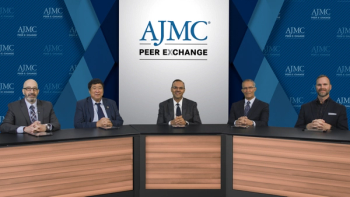
Experts share their final thoughts on the discussion, offering key takeaways and reflections on the importance of lipoprotein(a) (Lp[a]) testing and its role in improving cardiovascular risk management

Experts share their final thoughts on the discussion, offering key takeaways and reflections on the importance of lipoprotein(a) (Lp[a]) testing and its role in improving cardiovascular risk management

Experts discuss lessons learned from implementing lipid-lowering therapy recommendations and explore the role value-based care models may play in successfully adopting the National Lipid Association’s (NLA) recommendation for lipoprotein(a) (Lp[a]) testing.

Experts discuss lessons learned from implementing lipoprotein(a) (Lp[a]) testing in health care systems, how health systems can prioritize patients for testing based on the National Lipid Association’s (NLA) recommendation, the role of integrated delivery networks in helping providers identify priority patients, and strategies for adding electronic health record alerts for Lp(a) testing.

Experts discuss the current prevalence of lipoprotein(a) (Lp[a]) testing in the US, both in the general population and among those with established atherosclerotic cardiovascular disease (ASCVD), its commonality within health plans, and how payers, population health decision makers, and provider groups can integrate Lp(a) testing into broader population health management strategies.

Experts discuss how knowledge of lipoprotein(a) (Lp[a]) levels can empower patients in managing atherosclerotic cardiovascular disease (ASCVD) risk factors, how providers can collaborate with patients on Lp(a) testing and risk management, the potential population-level value of improved ASCVD risk assessment, and how the National Lipid Association’s (NLA) recommendation for one-time Lp(a) testing may benefit health systems.

Experts discuss how lipoprotein(a) (Lp[a]) testing, even without targeted Lp(a)-lowering therapies, can enhance overall cardiovascular risk assessment and potentially influence the management of other risk factors.

Experts discuss FDA-approved therapies for high lipoprotein(a) [Lp[a]) levels, their benefits and shortcomings, the frequency of their use in health plans, emerging therapies in the pipeline, and the expected timeline for associated data release.

Experts discuss the cost of lipoprotein(a) (Lp[a]) tests and how these costs, along with the National Lipid Association’s (NLA) recommendation and supporting clinical evidence, may influence payer decisions regarding coverage for Lp(a) testing.

Experts discuss whether providers should wait for another complete scientific statement from the National Lipid Association (NLA) or new guidelines from organizations like the American Heart Association (AHA) before implementing the 2024 NLA recommendation for universal lipoprotein(a) (Lp[a]) measurement.

Experts discuss the evidence supporting the National Lipid Association’s (NLA) recommendation for universal lipoprotein(a) (Lp[a]) measurement and evaluate how compelling this evidence is from a clinical perspective.

Experts discuss how guideline recommendations influence formulary decisions regarding preventive measures like lipoprotein(a) (Lp[a]) testing, exploring the varying recommendations from organizations such as the American Association of Clinical Endocrinologists, the American Heart Association, and the National Lipid Association (NLA), and how these align with recent guidance from Europe and Canada.

Experts discuss an example illustrating the association between lipoprotein(a) (Lp[a]) levels and atherosclerotic cardiovascular disease (ASCVD) risk and explore how this example can inform our understanding of Lp(a) and ASCVD risk on a population level.

Experts discuss the genetic determinants of lipoprotein(a) (Lp[a]) levels, providing evidence supporting this conclusion. They also explore how the hereditary nature of Lp(a) can drive awareness of atherosclerotic cardiovascular disease (ASCVD) and aortic stenosis risk, potentially influencing screening protocols.

Experts discuss the evidence supporting the continuous relationship between lipoprotein(a) (Lp[a]) levels and atherosclerotic cardiovascular disease (ASCVD), as recognized by the National Lipid Association, and explore how Lp(a) levels may change throughout a person’s lifetime or in response to lifestyle factors.

Experts discuss the relationship between lipoprotein(a) (Lp[a]) levels and atherosclerotic cardiovascular disease (ASCVD) risk, with findings from a large US population study, and explore how these findings could impact clinical practice and the management of patients at risk for ASCVD.

Experts discuss the clinical and economic burden of atherosclerotic cardiovascular disease (ASCVD) and aortic stenosis in the US, exploring their impact on health care systems, the importance of prevention in reducing this burden, and the challenges of implementing preventive strategies, while considering the potential benefits of improved risk assessment and prevention in the ASCVD space.

Experts discuss atherosclerotic cardiovascular disease and aortic stenosis, as well as their burden, highlighting their prevalence, impact on patient health, and the growing need for effective management strategies.

Published: March 31st 2025 | Updated:

Published: March 31st 2025 | Updated:

Published: March 24th 2025 | Updated:

Published: March 24th 2025 | Updated:

259 Prospect Plains Rd, Bldg H
Cranbury, NJ 08512
© 2025 MJH Life Sciences®
All rights reserved.
